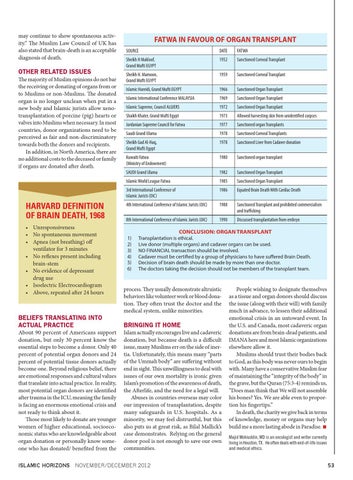may continue to show spontaneous activity.” The Muslim Law Council of UK has also stated that brain-death is an acceptable diagnosis of death.
Other related issues The majority of Muslim opinions do not bar the receiving or donating of organs from or to Muslims or non-Muslims. The donated organ is no longer unclean when put in a new body and Islamic jurists allow xenotransplantation of porcine (pig) hearts or valves into Muslims when necessary. In most countries, donor organizations need to be perceived as fair and non-discriminatory towards both the donors and recipients. In addition, in North America, there are no additional costs to the deceased or family if organs are donated after death.
Harvard Definition of Brain Death, 1968 • Unresponsiveness • No spontaneous movement • Apnea (not breathing) off ventilator for 3 minutes • No reflexes present including brain-stem • No evidence of depressant drug use • Isoelectric Electrocardiogram • Above, repeated after 24 hours
Beliefs Translating into Actual Practice About 90 percent of Americans support donation, but only 30 percent know the essential steps to become a donor. Only 40 percent of potential organ donors and 24 percent of potential tissue donors actually become one. Beyond religious belief, there are emotional responses and cultural values that translate into actual practice. In reality, most potential organ donors are identified after trauma in the ICU, meaning the family is facing an enormous emotional crisis and not ready to think about it. Those most likely to donate are younger women of higher educational, socioeconomic status who are knowledgeable about organ donation or personally know someone who has donated/ benefited from the
FATWA IN FAVOUR OF ORGAN TRANSPLANT SOURCE
DATE
FATWA
Sheikh H Makloof, Grand Mufti EGYPT
1952
Sanctioned Corneal Transplant
Sheikh H. Mamoon, Grand Mufti EGYPT
1959
Sanctioned Corneal Transplant
Islamic Hureidi, Grand Mufti EGYPT
1966
Sanctioned Organ Transplant
Islamic International Conference MALAYSIA
1969
Sanctioned Organ Transplant
Islamic Supreme, Council ALGIERS
1972
Sanctioned Organ Transplant
Shaikh Khater, Grand Mufti Egypt
1973
Allowed harvesting skin from unidentified corpses
Jordanian Supreme Council for Fatwa
1977
Sanctioned organ Transplants
Saudi Grand Ulama
1978
Sanctioned Corneal Transplants
Sheikh Gad Al-Haq, Grand Mufti Egypt
1978
Sanctioned Liver from Cadaver donation
Kuwaiti Fatwa (Ministry of Endowment)
1980
Sanctioned organ transplant
SAUDI Grand Ulama
1982
Sanctioned Organ Transplant
Islamic World League Fatwa
1985
Sanctioned Organ Transplant
3rd International Conference of Islamic Jurists (OIC)
1986
Equated Brain Death With Cardiac Death
4th International Conference of Islamic Jurists (OIC)
1988
Sanctioned Transplant and prohibited commercialism and trafficking
8th International Conference of Islamic Jurists (OIC)
1990
Discussed transplantation from embryo
1) 2) 3) 4) 5) 6)
CONCLUSION: ORGAN TRANSPLANT
Transplantation is ethical. Live donor (multiple organs) and cadaver organs can be used. NO FINANCIAL transaction should be involved. Cadaver must be certified by a group of physicians to have suffered Brain Death. Decision of brain death should be made by more than one doctor. The doctors taking the decision should not be members of the transplant team.
process. They usually demonstrate altruistic behaviors like volunteer work or blood donation. They often trust the doctor and the medical system, unlike minorities.
Bringing it home
Islam actually encourages live and cadaveric donation, but because death is a difficult issue, many Muslims err on the side of inertia. Unfortunately, this means many “parts of the Ummah body” are suffering without end in sight. This unwillingness to deal with issues of our own mortality is ironic given Islam’s promotion of the awareness of death, the Afterlife, and the need for a legal will. Abuses in countries overseas may color our impression of transplantation, despite many safeguards in U.S. hospitals. As a minority, we may feel distrustful, but this also puts us at great risk, as Bilal Mallick’s case demonstrates. Relying on the general donor pool is not enough to save our own communities.
Islamic Horizons November/December 2012
People wishing to designate themselves as a tissue and organ donors should discuss the issue (along with their will) with family much in advance, to lessen their additional emotional crisis in an untoward event. In the U.S. and Canada, most cadaveric organ donations are from brain-dead patients, and IMANA here and most Islamic organizations elsewhere allow it. Muslims should trust their bodies back to God, as this body was never ours to begin with. Many have a conservative Muslim fear of maintaining the “integrity of the body” in the grave, but the Quran (75:3-4) reminds us, “Does man think that We will not assemble his bones? Yes. We are able even to proportion his fingertips.” In death, the charity we give back in terms of knowledge, money or organs may help build me a more lasting abode in Paradise.
■
Majid Mohiuddin, MD is an oncologist and writer currently living in Houston, TX. He often deals with end-of-life issues and medical ethics.
53
